University of Northampton Law 1006: Separation of Powers in the UK
VerifiedAdded on 2023/04/22
|9
|3114
|303
Essay
AI Summary
This essay examines the doctrine of the separation of powers as it operates in the United Kingdom, addressing the statement by Parpworth. It begins by defining the separation of powers and its significance for democratic governance, drawing upon the ideas of Montesquieu and others. The essay then explores the UK's constitutional framework, highlighting the roles of the legislative (Parliament), executive (monarch, Prime Minister, and Cabinet), and judicial branches. It analyzes the system of checks and balances within the UK, including parliamentary sovereignty, ministerial accountability, and judicial review, while also acknowledging the overlaps in personnel and functions. The essay discusses how the Human Rights Act 1998 impacts the separation of powers. The essay concludes by assessing the extent to which Parpworth's statement is accurate, considering the unique characteristics of the UK constitution and the practical application of the separation of powers principle.
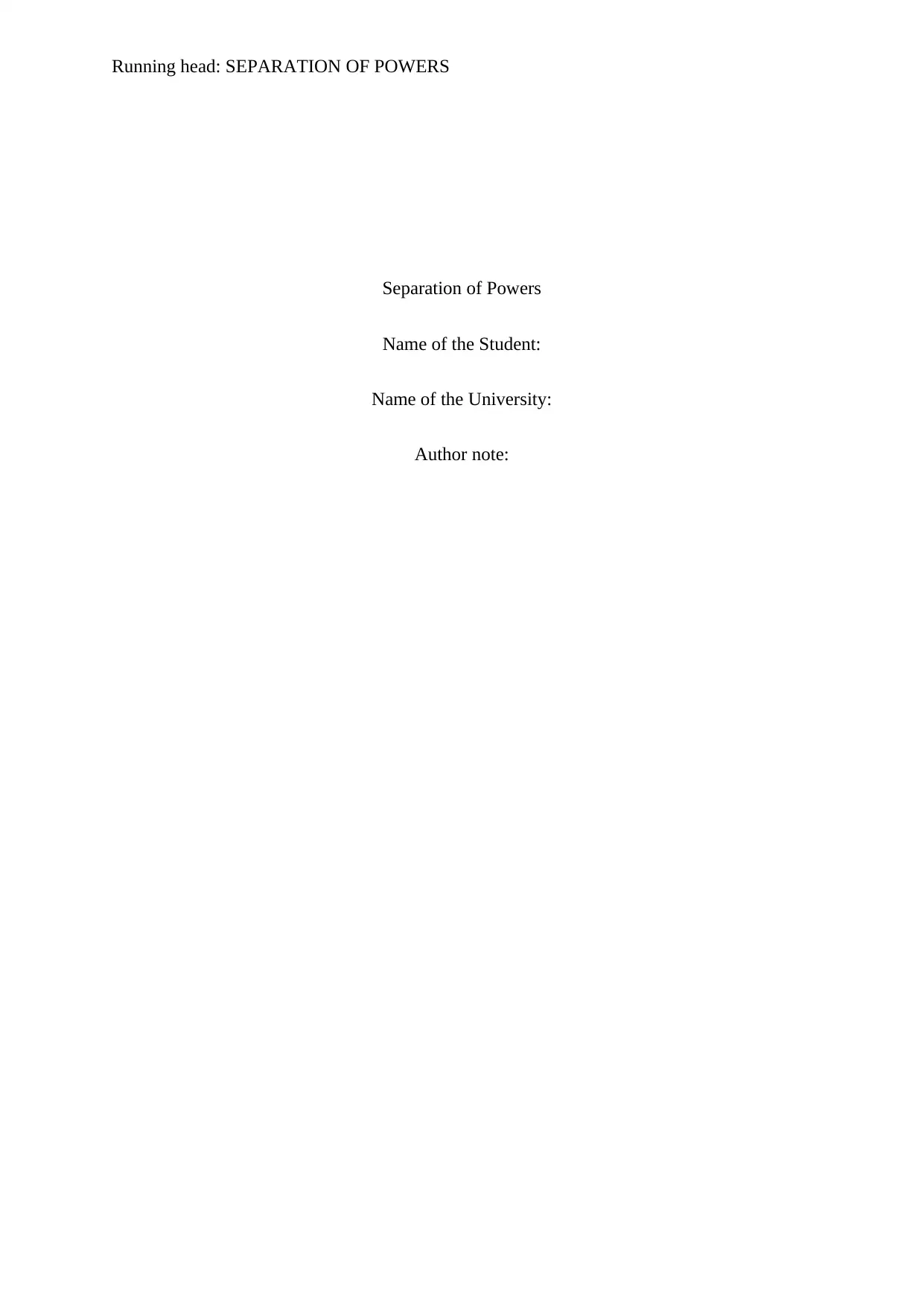
Running head: SEPARATION OF POWERS
Separation of Powers
Name of the Student:
Name of the University:
Author note:
Separation of Powers
Name of the Student:
Name of the University:
Author note:
Paraphrase This Document
Need a fresh take? Get an instant paraphrase of this document with our AI Paraphraser
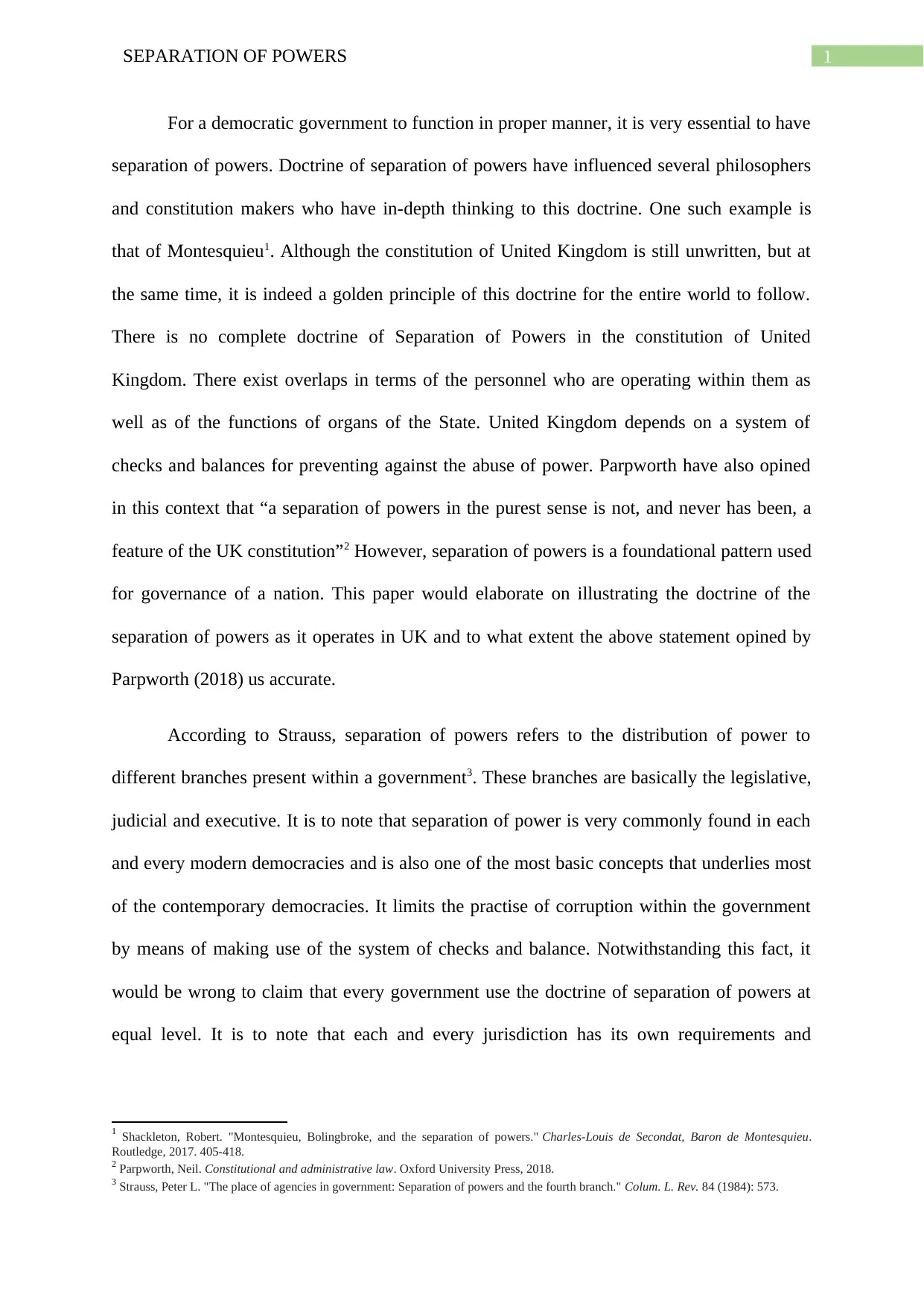
1SEPARATION OF POWERS
For a democratic government to function in proper manner, it is very essential to have
separation of powers. Doctrine of separation of powers have influenced several philosophers
and constitution makers who have in-depth thinking to this doctrine. One such example is
that of Montesquieu1. Although the constitution of United Kingdom is still unwritten, but at
the same time, it is indeed a golden principle of this doctrine for the entire world to follow.
There is no complete doctrine of Separation of Powers in the constitution of United
Kingdom. There exist overlaps in terms of the personnel who are operating within them as
well as of the functions of organs of the State. United Kingdom depends on a system of
checks and balances for preventing against the abuse of power. Parpworth have also opined
in this context that “a separation of powers in the purest sense is not, and never has been, a
feature of the UK constitution”2 However, separation of powers is a foundational pattern used
for governance of a nation. This paper would elaborate on illustrating the doctrine of the
separation of powers as it operates in UK and to what extent the above statement opined by
Parpworth (2018) us accurate.
According to Strauss, separation of powers refers to the distribution of power to
different branches present within a government3. These branches are basically the legislative,
judicial and executive. It is to note that separation of power is very commonly found in each
and every modern democracies and is also one of the most basic concepts that underlies most
of the contemporary democracies. It limits the practise of corruption within the government
by means of making use of the system of checks and balance. Notwithstanding this fact, it
would be wrong to claim that every government use the doctrine of separation of powers at
equal level. It is to note that each and every jurisdiction has its own requirements and
1 Shackleton, Robert. "Montesquieu, Bolingbroke, and the separation of powers." Charles-Louis de Secondat, Baron de Montesquieu.
Routledge, 2017. 405-418.
2 Parpworth, Neil. Constitutional and administrative law. Oxford University Press, 2018.
3 Strauss, Peter L. "The place of agencies in government: Separation of powers and the fourth branch." Colum. L. Rev. 84 (1984): 573.
For a democratic government to function in proper manner, it is very essential to have
separation of powers. Doctrine of separation of powers have influenced several philosophers
and constitution makers who have in-depth thinking to this doctrine. One such example is
that of Montesquieu1. Although the constitution of United Kingdom is still unwritten, but at
the same time, it is indeed a golden principle of this doctrine for the entire world to follow.
There is no complete doctrine of Separation of Powers in the constitution of United
Kingdom. There exist overlaps in terms of the personnel who are operating within them as
well as of the functions of organs of the State. United Kingdom depends on a system of
checks and balances for preventing against the abuse of power. Parpworth have also opined
in this context that “a separation of powers in the purest sense is not, and never has been, a
feature of the UK constitution”2 However, separation of powers is a foundational pattern used
for governance of a nation. This paper would elaborate on illustrating the doctrine of the
separation of powers as it operates in UK and to what extent the above statement opined by
Parpworth (2018) us accurate.
According to Strauss, separation of powers refers to the distribution of power to
different branches present within a government3. These branches are basically the legislative,
judicial and executive. It is to note that separation of power is very commonly found in each
and every modern democracies and is also one of the most basic concepts that underlies most
of the contemporary democracies. It limits the practise of corruption within the government
by means of making use of the system of checks and balance. Notwithstanding this fact, it
would be wrong to claim that every government use the doctrine of separation of powers at
equal level. It is to note that each and every jurisdiction has its own requirements and
1 Shackleton, Robert. "Montesquieu, Bolingbroke, and the separation of powers." Charles-Louis de Secondat, Baron de Montesquieu.
Routledge, 2017. 405-418.
2 Parpworth, Neil. Constitutional and administrative law. Oxford University Press, 2018.
3 Strauss, Peter L. "The place of agencies in government: Separation of powers and the fourth branch." Colum. L. Rev. 84 (1984): 573.
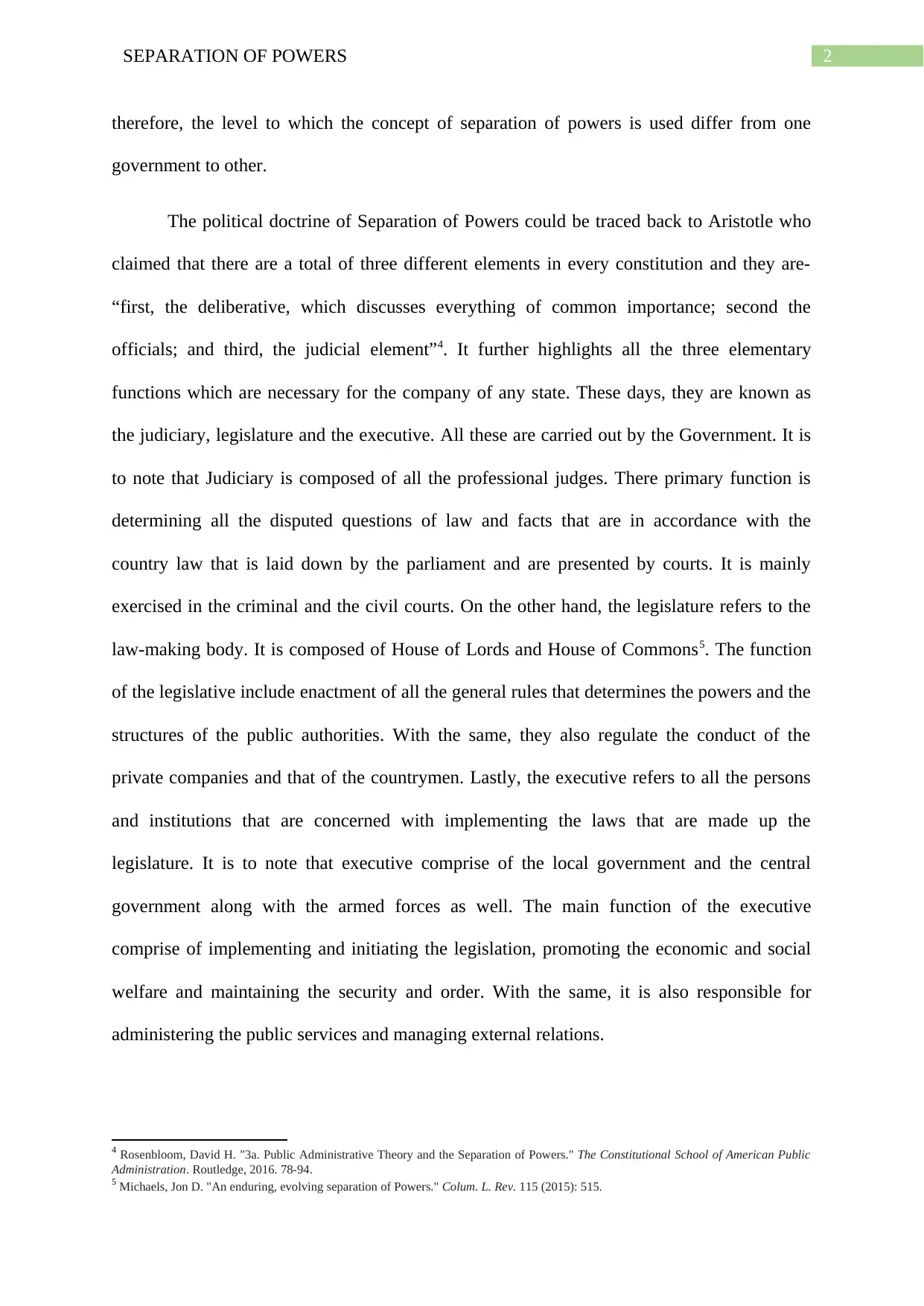
2SEPARATION OF POWERS
therefore, the level to which the concept of separation of powers is used differ from one
government to other.
The political doctrine of Separation of Powers could be traced back to Aristotle who
claimed that there are a total of three different elements in every constitution and they are-
“first, the deliberative, which discusses everything of common importance; second the
officials; and third, the judicial element”4. It further highlights all the three elementary
functions which are necessary for the company of any state. These days, they are known as
the judiciary, legislature and the executive. All these are carried out by the Government. It is
to note that Judiciary is composed of all the professional judges. There primary function is
determining all the disputed questions of law and facts that are in accordance with the
country law that is laid down by the parliament and are presented by courts. It is mainly
exercised in the criminal and the civil courts. On the other hand, the legislature refers to the
law-making body. It is composed of House of Lords and House of Commons5. The function
of the legislative include enactment of all the general rules that determines the powers and the
structures of the public authorities. With the same, they also regulate the conduct of the
private companies and that of the countrymen. Lastly, the executive refers to all the persons
and institutions that are concerned with implementing the laws that are made up the
legislature. It is to note that executive comprise of the local government and the central
government along with the armed forces as well. The main function of the executive
comprise of implementing and initiating the legislation, promoting the economic and social
welfare and maintaining the security and order. With the same, it is also responsible for
administering the public services and managing external relations.
4 Rosenbloom, David H. "3a. Public Administrative Theory and the Separation of Powers." The Constitutional School of American Public
Administration. Routledge, 2016. 78-94.
5 Michaels, Jon D. "An enduring, evolving separation of Powers." Colum. L. Rev. 115 (2015): 515.
therefore, the level to which the concept of separation of powers is used differ from one
government to other.
The political doctrine of Separation of Powers could be traced back to Aristotle who
claimed that there are a total of three different elements in every constitution and they are-
“first, the deliberative, which discusses everything of common importance; second the
officials; and third, the judicial element”4. It further highlights all the three elementary
functions which are necessary for the company of any state. These days, they are known as
the judiciary, legislature and the executive. All these are carried out by the Government. It is
to note that Judiciary is composed of all the professional judges. There primary function is
determining all the disputed questions of law and facts that are in accordance with the
country law that is laid down by the parliament and are presented by courts. It is mainly
exercised in the criminal and the civil courts. On the other hand, the legislature refers to the
law-making body. It is composed of House of Lords and House of Commons5. The function
of the legislative include enactment of all the general rules that determines the powers and the
structures of the public authorities. With the same, they also regulate the conduct of the
private companies and that of the countrymen. Lastly, the executive refers to all the persons
and institutions that are concerned with implementing the laws that are made up the
legislature. It is to note that executive comprise of the local government and the central
government along with the armed forces as well. The main function of the executive
comprise of implementing and initiating the legislation, promoting the economic and social
welfare and maintaining the security and order. With the same, it is also responsible for
administering the public services and managing external relations.
4 Rosenbloom, David H. "3a. Public Administrative Theory and the Separation of Powers." The Constitutional School of American Public
Administration. Routledge, 2016. 78-94.
5 Michaels, Jon D. "An enduring, evolving separation of Powers." Colum. L. Rev. 115 (2015): 515.
⊘ This is a preview!⊘
Do you want full access?
Subscribe today to unlock all pages.

Trusted by 1+ million students worldwide
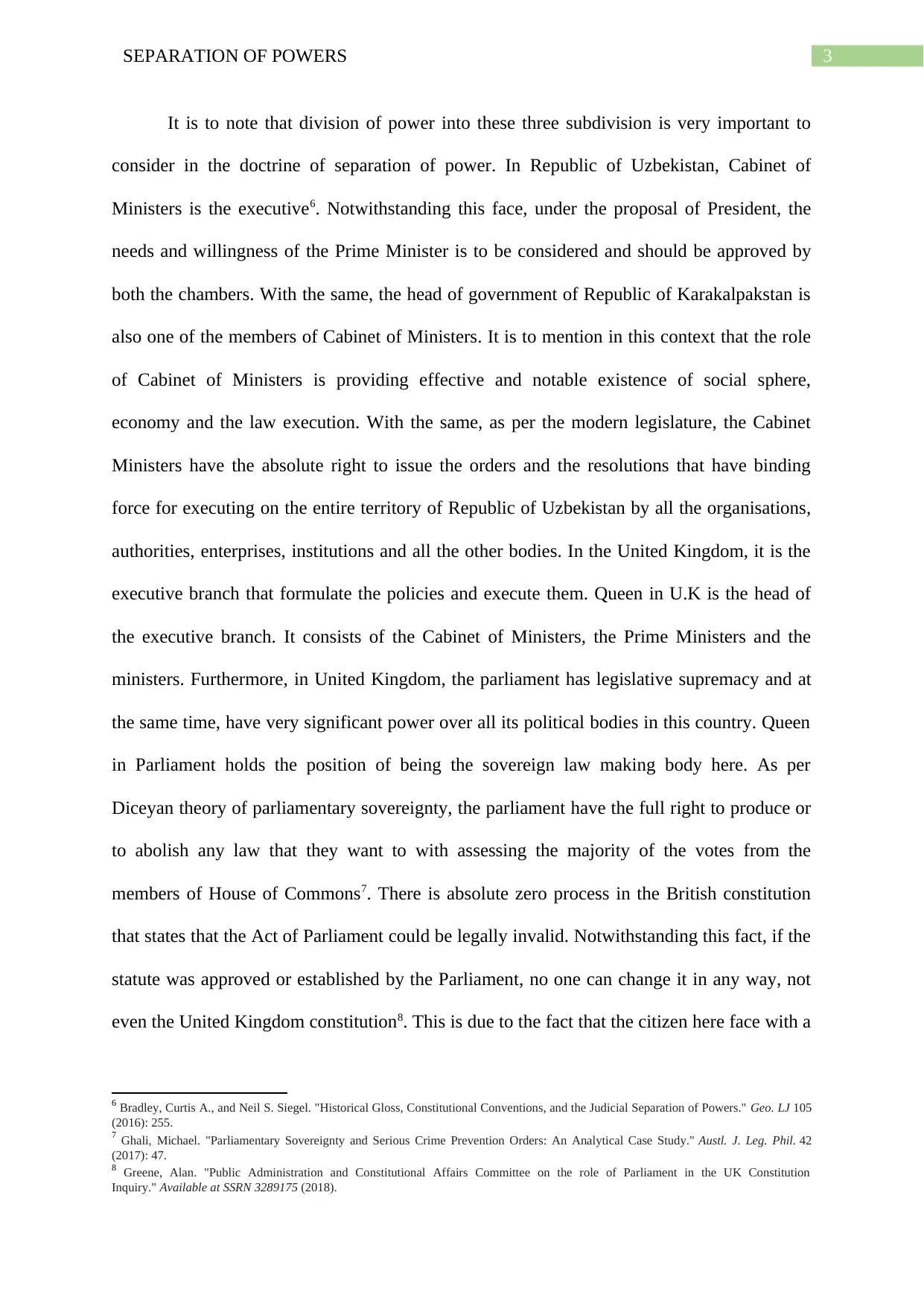
3SEPARATION OF POWERS
It is to note that division of power into these three subdivision is very important to
consider in the doctrine of separation of power. In Republic of Uzbekistan, Cabinet of
Ministers is the executive6. Notwithstanding this face, under the proposal of President, the
needs and willingness of the Prime Minister is to be considered and should be approved by
both the chambers. With the same, the head of government of Republic of Karakalpakstan is
also one of the members of Cabinet of Ministers. It is to mention in this context that the role
of Cabinet of Ministers is providing effective and notable existence of social sphere,
economy and the law execution. With the same, as per the modern legislature, the Cabinet
Ministers have the absolute right to issue the orders and the resolutions that have binding
force for executing on the entire territory of Republic of Uzbekistan by all the organisations,
authorities, enterprises, institutions and all the other bodies. In the United Kingdom, it is the
executive branch that formulate the policies and execute them. Queen in U.K is the head of
the executive branch. It consists of the Cabinet of Ministers, the Prime Ministers and the
ministers. Furthermore, in United Kingdom, the parliament has legislative supremacy and at
the same time, have very significant power over all its political bodies in this country. Queen
in Parliament holds the position of being the sovereign law making body here. As per
Diceyan theory of parliamentary sovereignty, the parliament have the full right to produce or
to abolish any law that they want to with assessing the majority of the votes from the
members of House of Commons7. There is absolute zero process in the British constitution
that states that the Act of Parliament could be legally invalid. Notwithstanding this fact, if the
statute was approved or established by the Parliament, no one can change it in any way, not
even the United Kingdom constitution8. This is due to the fact that the citizen here face with a
6 Bradley, Curtis A., and Neil S. Siegel. "Historical Gloss, Constitutional Conventions, and the Judicial Separation of Powers." Geo. LJ 105
(2016): 255.
7 Ghali, Michael. "Parliamentary Sovereignty and Serious Crime Prevention Orders: An Analytical Case Study." Austl. J. Leg. Phil. 42
(2017): 47.
8 Greene, Alan. "Public Administration and Constitutional Affairs Committee on the role of Parliament in the UK Constitution
Inquiry." Available at SSRN 3289175 (2018).
It is to note that division of power into these three subdivision is very important to
consider in the doctrine of separation of power. In Republic of Uzbekistan, Cabinet of
Ministers is the executive6. Notwithstanding this face, under the proposal of President, the
needs and willingness of the Prime Minister is to be considered and should be approved by
both the chambers. With the same, the head of government of Republic of Karakalpakstan is
also one of the members of Cabinet of Ministers. It is to mention in this context that the role
of Cabinet of Ministers is providing effective and notable existence of social sphere,
economy and the law execution. With the same, as per the modern legislature, the Cabinet
Ministers have the absolute right to issue the orders and the resolutions that have binding
force for executing on the entire territory of Republic of Uzbekistan by all the organisations,
authorities, enterprises, institutions and all the other bodies. In the United Kingdom, it is the
executive branch that formulate the policies and execute them. Queen in U.K is the head of
the executive branch. It consists of the Cabinet of Ministers, the Prime Ministers and the
ministers. Furthermore, in United Kingdom, the parliament has legislative supremacy and at
the same time, have very significant power over all its political bodies in this country. Queen
in Parliament holds the position of being the sovereign law making body here. As per
Diceyan theory of parliamentary sovereignty, the parliament have the full right to produce or
to abolish any law that they want to with assessing the majority of the votes from the
members of House of Commons7. There is absolute zero process in the British constitution
that states that the Act of Parliament could be legally invalid. Notwithstanding this fact, if the
statute was approved or established by the Parliament, no one can change it in any way, not
even the United Kingdom constitution8. This is due to the fact that the citizen here face with a
6 Bradley, Curtis A., and Neil S. Siegel. "Historical Gloss, Constitutional Conventions, and the Judicial Separation of Powers." Geo. LJ 105
(2016): 255.
7 Ghali, Michael. "Parliamentary Sovereignty and Serious Crime Prevention Orders: An Analytical Case Study." Austl. J. Leg. Phil. 42
(2017): 47.
8 Greene, Alan. "Public Administration and Constitutional Affairs Committee on the role of Parliament in the UK Constitution
Inquiry." Available at SSRN 3289175 (2018).
Paraphrase This Document
Need a fresh take? Get an instant paraphrase of this document with our AI Paraphraser
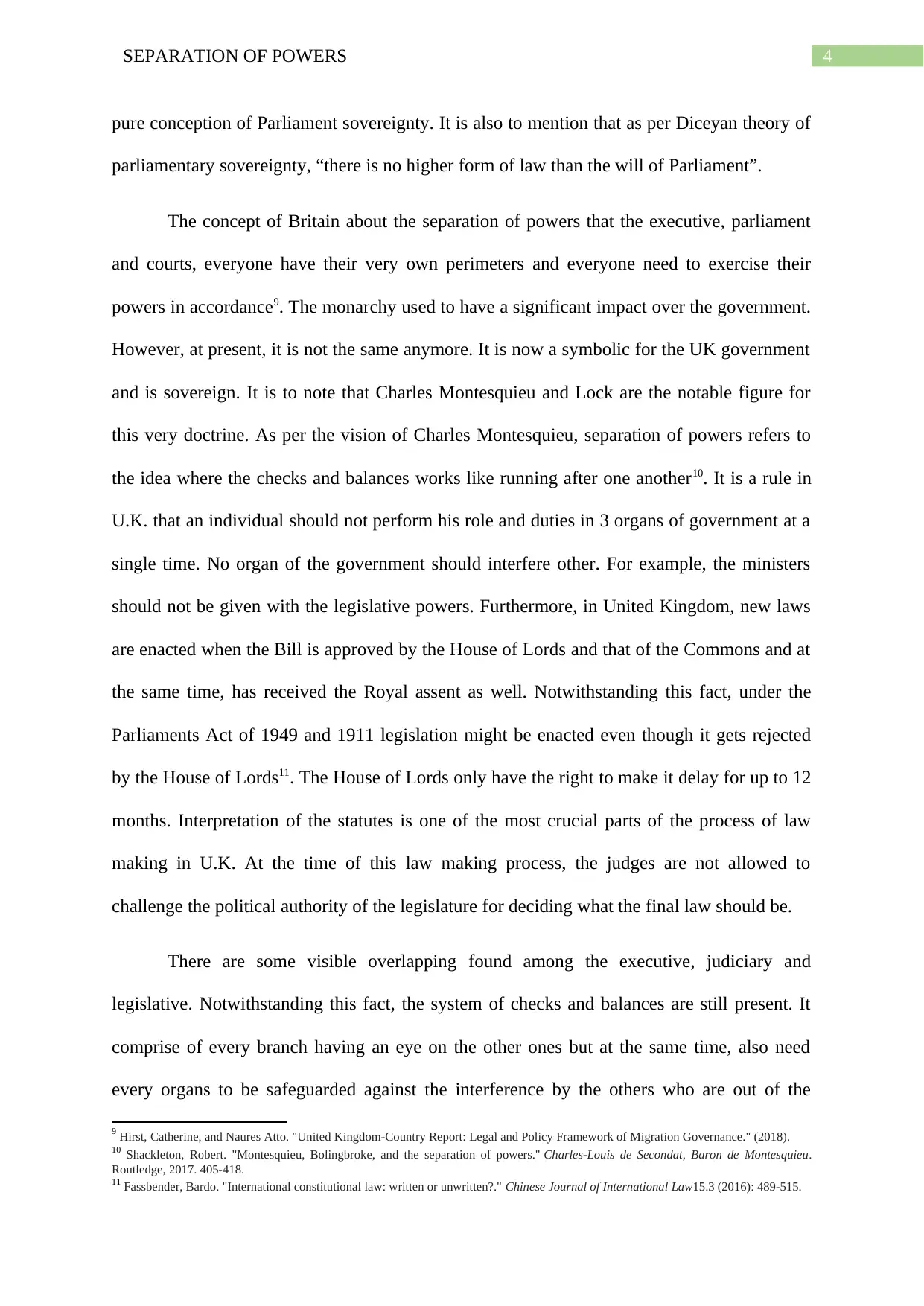
4SEPARATION OF POWERS
pure conception of Parliament sovereignty. It is also to mention that as per Diceyan theory of
parliamentary sovereignty, “there is no higher form of law than the will of Parliament”.
The concept of Britain about the separation of powers that the executive, parliament
and courts, everyone have their very own perimeters and everyone need to exercise their
powers in accordance9. The monarchy used to have a significant impact over the government.
However, at present, it is not the same anymore. It is now a symbolic for the UK government
and is sovereign. It is to note that Charles Montesquieu and Lock are the notable figure for
this very doctrine. As per the vision of Charles Montesquieu, separation of powers refers to
the idea where the checks and balances works like running after one another10. It is a rule in
U.K. that an individual should not perform his role and duties in 3 organs of government at a
single time. No organ of the government should interfere other. For example, the ministers
should not be given with the legislative powers. Furthermore, in United Kingdom, new laws
are enacted when the Bill is approved by the House of Lords and that of the Commons and at
the same time, has received the Royal assent as well. Notwithstanding this fact, under the
Parliaments Act of 1949 and 1911 legislation might be enacted even though it gets rejected
by the House of Lords11. The House of Lords only have the right to make it delay for up to 12
months. Interpretation of the statutes is one of the most crucial parts of the process of law
making in U.K. At the time of this law making process, the judges are not allowed to
challenge the political authority of the legislature for deciding what the final law should be.
There are some visible overlapping found among the executive, judiciary and
legislative. Notwithstanding this fact, the system of checks and balances are still present. It
comprise of every branch having an eye on the other ones but at the same time, also need
every organs to be safeguarded against the interference by the others who are out of the
9 Hirst, Catherine, and Naures Atto. "United Kingdom-Country Report: Legal and Policy Framework of Migration Governance." (2018).
10 Shackleton, Robert. "Montesquieu, Bolingbroke, and the separation of powers." Charles-Louis de Secondat, Baron de Montesquieu.
Routledge, 2017. 405-418.
11 Fassbender, Bardo. "International constitutional law: written or unwritten?." Chinese Journal of International Law15.3 (2016): 489-515.
pure conception of Parliament sovereignty. It is also to mention that as per Diceyan theory of
parliamentary sovereignty, “there is no higher form of law than the will of Parliament”.
The concept of Britain about the separation of powers that the executive, parliament
and courts, everyone have their very own perimeters and everyone need to exercise their
powers in accordance9. The monarchy used to have a significant impact over the government.
However, at present, it is not the same anymore. It is now a symbolic for the UK government
and is sovereign. It is to note that Charles Montesquieu and Lock are the notable figure for
this very doctrine. As per the vision of Charles Montesquieu, separation of powers refers to
the idea where the checks and balances works like running after one another10. It is a rule in
U.K. that an individual should not perform his role and duties in 3 organs of government at a
single time. No organ of the government should interfere other. For example, the ministers
should not be given with the legislative powers. Furthermore, in United Kingdom, new laws
are enacted when the Bill is approved by the House of Lords and that of the Commons and at
the same time, has received the Royal assent as well. Notwithstanding this fact, under the
Parliaments Act of 1949 and 1911 legislation might be enacted even though it gets rejected
by the House of Lords11. The House of Lords only have the right to make it delay for up to 12
months. Interpretation of the statutes is one of the most crucial parts of the process of law
making in U.K. At the time of this law making process, the judges are not allowed to
challenge the political authority of the legislature for deciding what the final law should be.
There are some visible overlapping found among the executive, judiciary and
legislative. Notwithstanding this fact, the system of checks and balances are still present. It
comprise of every branch having an eye on the other ones but at the same time, also need
every organs to be safeguarded against the interference by the others who are out of the
9 Hirst, Catherine, and Naures Atto. "United Kingdom-Country Report: Legal and Policy Framework of Migration Governance." (2018).
10 Shackleton, Robert. "Montesquieu, Bolingbroke, and the separation of powers." Charles-Louis de Secondat, Baron de Montesquieu.
Routledge, 2017. 405-418.
11 Fassbender, Bardo. "International constitutional law: written or unwritten?." Chinese Journal of International Law15.3 (2016): 489-515.
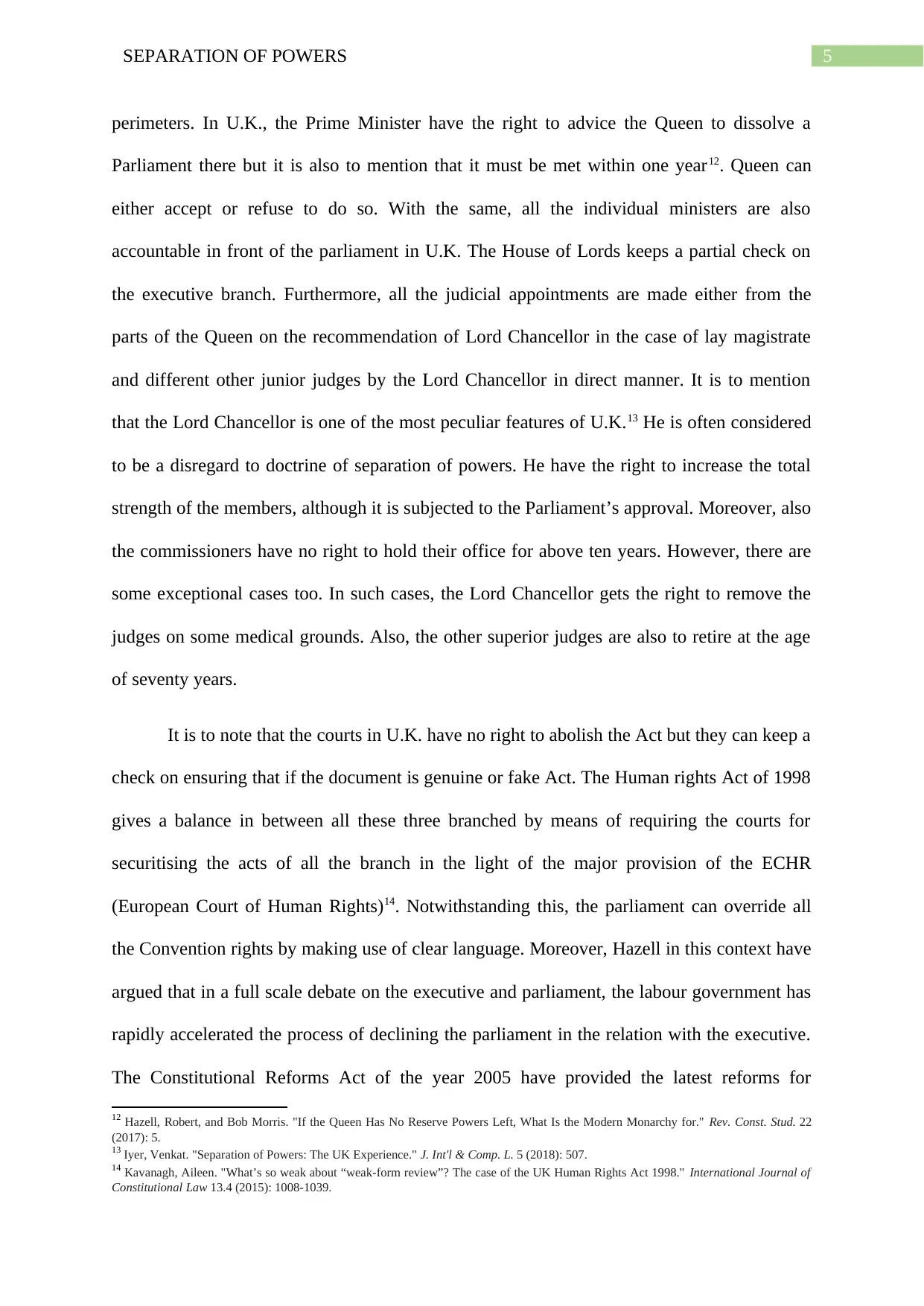
5SEPARATION OF POWERS
perimeters. In U.K., the Prime Minister have the right to advice the Queen to dissolve a
Parliament there but it is also to mention that it must be met within one year12. Queen can
either accept or refuse to do so. With the same, all the individual ministers are also
accountable in front of the parliament in U.K. The House of Lords keeps a partial check on
the executive branch. Furthermore, all the judicial appointments are made either from the
parts of the Queen on the recommendation of Lord Chancellor in the case of lay magistrate
and different other junior judges by the Lord Chancellor in direct manner. It is to mention
that the Lord Chancellor is one of the most peculiar features of U.K.13 He is often considered
to be a disregard to doctrine of separation of powers. He have the right to increase the total
strength of the members, although it is subjected to the Parliament’s approval. Moreover, also
the commissioners have no right to hold their office for above ten years. However, there are
some exceptional cases too. In such cases, the Lord Chancellor gets the right to remove the
judges on some medical grounds. Also, the other superior judges are also to retire at the age
of seventy years.
It is to note that the courts in U.K. have no right to abolish the Act but they can keep a
check on ensuring that if the document is genuine or fake Act. The Human rights Act of 1998
gives a balance in between all these three branched by means of requiring the courts for
securitising the acts of all the branch in the light of the major provision of the ECHR
(European Court of Human Rights)14. Notwithstanding this, the parliament can override all
the Convention rights by making use of clear language. Moreover, Hazell in this context have
argued that in a full scale debate on the executive and parliament, the labour government has
rapidly accelerated the process of declining the parliament in the relation with the executive.
The Constitutional Reforms Act of the year 2005 have provided the latest reforms for
12 Hazell, Robert, and Bob Morris. "If the Queen Has No Reserve Powers Left, What Is the Modern Monarchy for." Rev. Const. Stud. 22
(2017): 5.
13 Iyer, Venkat. "Separation of Powers: The UK Experience." J. Int'l & Comp. L. 5 (2018): 507.
14 Kavanagh, Aileen. "What’s so weak about “weak-form review”? The case of the UK Human Rights Act 1998." International Journal of
Constitutional Law 13.4 (2015): 1008-1039.
perimeters. In U.K., the Prime Minister have the right to advice the Queen to dissolve a
Parliament there but it is also to mention that it must be met within one year12. Queen can
either accept or refuse to do so. With the same, all the individual ministers are also
accountable in front of the parliament in U.K. The House of Lords keeps a partial check on
the executive branch. Furthermore, all the judicial appointments are made either from the
parts of the Queen on the recommendation of Lord Chancellor in the case of lay magistrate
and different other junior judges by the Lord Chancellor in direct manner. It is to mention
that the Lord Chancellor is one of the most peculiar features of U.K.13 He is often considered
to be a disregard to doctrine of separation of powers. He have the right to increase the total
strength of the members, although it is subjected to the Parliament’s approval. Moreover, also
the commissioners have no right to hold their office for above ten years. However, there are
some exceptional cases too. In such cases, the Lord Chancellor gets the right to remove the
judges on some medical grounds. Also, the other superior judges are also to retire at the age
of seventy years.
It is to note that the courts in U.K. have no right to abolish the Act but they can keep a
check on ensuring that if the document is genuine or fake Act. The Human rights Act of 1998
gives a balance in between all these three branched by means of requiring the courts for
securitising the acts of all the branch in the light of the major provision of the ECHR
(European Court of Human Rights)14. Notwithstanding this, the parliament can override all
the Convention rights by making use of clear language. Moreover, Hazell in this context have
argued that in a full scale debate on the executive and parliament, the labour government has
rapidly accelerated the process of declining the parliament in the relation with the executive.
The Constitutional Reforms Act of the year 2005 have provided the latest reforms for
12 Hazell, Robert, and Bob Morris. "If the Queen Has No Reserve Powers Left, What Is the Modern Monarchy for." Rev. Const. Stud. 22
(2017): 5.
13 Iyer, Venkat. "Separation of Powers: The UK Experience." J. Int'l & Comp. L. 5 (2018): 507.
14 Kavanagh, Aileen. "What’s so weak about “weak-form review”? The case of the UK Human Rights Act 1998." International Journal of
Constitutional Law 13.4 (2015): 1008-1039.
⊘ This is a preview!⊘
Do you want full access?
Subscribe today to unlock all pages.

Trusted by 1+ million students worldwide
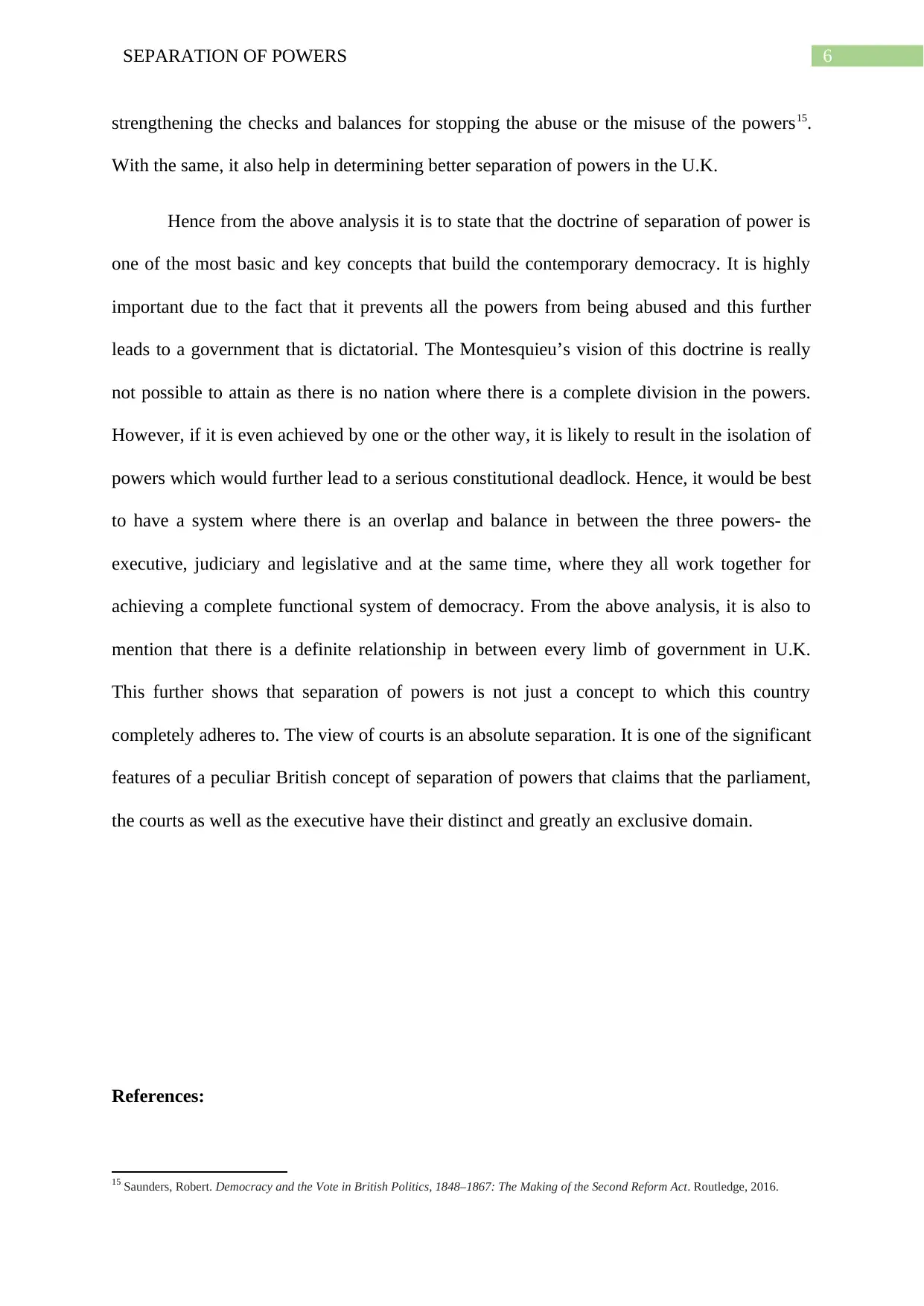
6SEPARATION OF POWERS
strengthening the checks and balances for stopping the abuse or the misuse of the powers15.
With the same, it also help in determining better separation of powers in the U.K.
Hence from the above analysis it is to state that the doctrine of separation of power is
one of the most basic and key concepts that build the contemporary democracy. It is highly
important due to the fact that it prevents all the powers from being abused and this further
leads to a government that is dictatorial. The Montesquieu’s vision of this doctrine is really
not possible to attain as there is no nation where there is a complete division in the powers.
However, if it is even achieved by one or the other way, it is likely to result in the isolation of
powers which would further lead to a serious constitutional deadlock. Hence, it would be best
to have a system where there is an overlap and balance in between the three powers- the
executive, judiciary and legislative and at the same time, where they all work together for
achieving a complete functional system of democracy. From the above analysis, it is also to
mention that there is a definite relationship in between every limb of government in U.K.
This further shows that separation of powers is not just a concept to which this country
completely adheres to. The view of courts is an absolute separation. It is one of the significant
features of a peculiar British concept of separation of powers that claims that the parliament,
the courts as well as the executive have their distinct and greatly an exclusive domain.
References:
15 Saunders, Robert. Democracy and the Vote in British Politics, 1848–1867: The Making of the Second Reform Act. Routledge, 2016.
strengthening the checks and balances for stopping the abuse or the misuse of the powers15.
With the same, it also help in determining better separation of powers in the U.K.
Hence from the above analysis it is to state that the doctrine of separation of power is
one of the most basic and key concepts that build the contemporary democracy. It is highly
important due to the fact that it prevents all the powers from being abused and this further
leads to a government that is dictatorial. The Montesquieu’s vision of this doctrine is really
not possible to attain as there is no nation where there is a complete division in the powers.
However, if it is even achieved by one or the other way, it is likely to result in the isolation of
powers which would further lead to a serious constitutional deadlock. Hence, it would be best
to have a system where there is an overlap and balance in between the three powers- the
executive, judiciary and legislative and at the same time, where they all work together for
achieving a complete functional system of democracy. From the above analysis, it is also to
mention that there is a definite relationship in between every limb of government in U.K.
This further shows that separation of powers is not just a concept to which this country
completely adheres to. The view of courts is an absolute separation. It is one of the significant
features of a peculiar British concept of separation of powers that claims that the parliament,
the courts as well as the executive have their distinct and greatly an exclusive domain.
References:
15 Saunders, Robert. Democracy and the Vote in British Politics, 1848–1867: The Making of the Second Reform Act. Routledge, 2016.
Paraphrase This Document
Need a fresh take? Get an instant paraphrase of this document with our AI Paraphraser
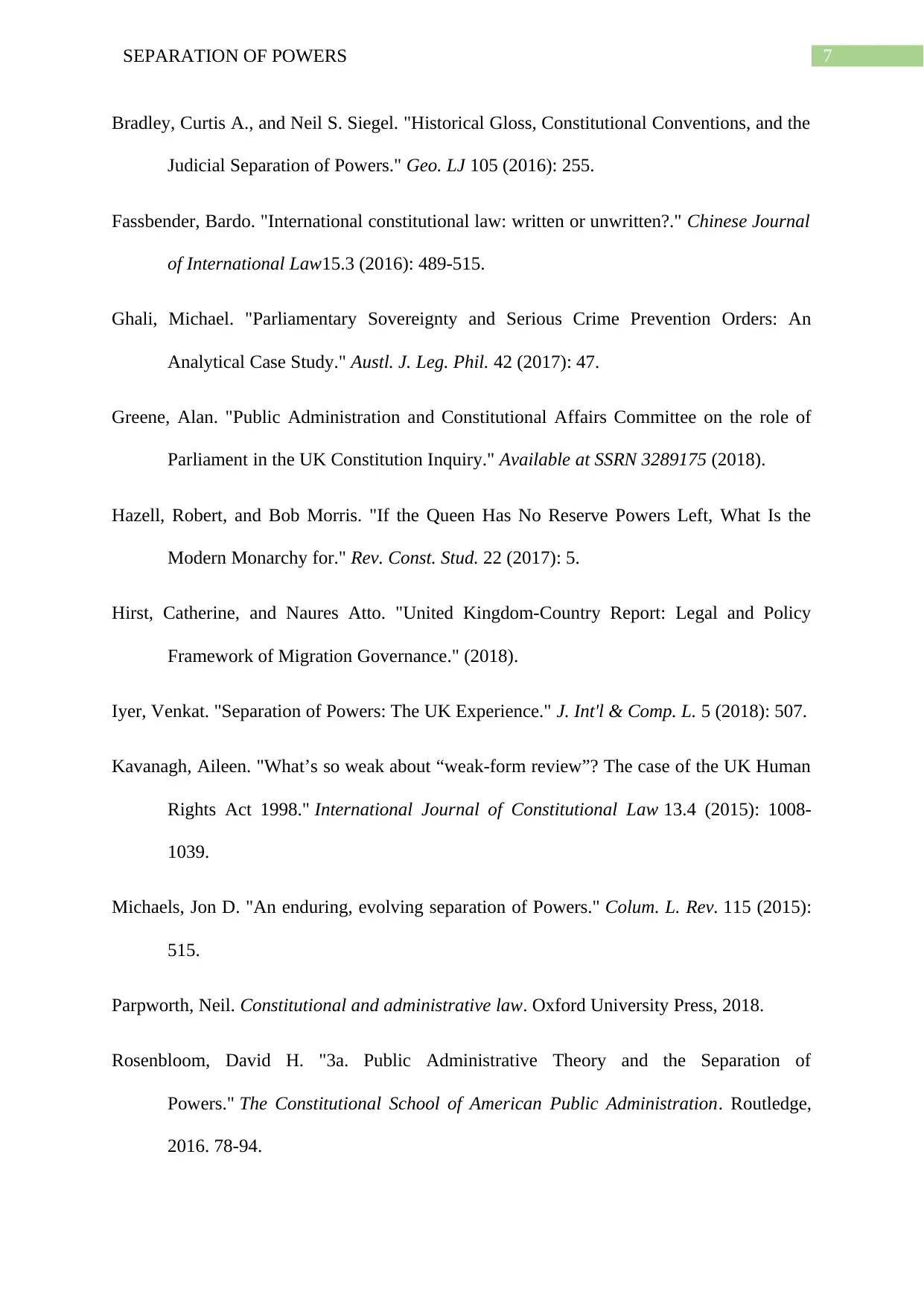
7SEPARATION OF POWERS
Bradley, Curtis A., and Neil S. Siegel. "Historical Gloss, Constitutional Conventions, and the
Judicial Separation of Powers." Geo. LJ 105 (2016): 255.
Fassbender, Bardo. "International constitutional law: written or unwritten?." Chinese Journal
of International Law15.3 (2016): 489-515.
Ghali, Michael. "Parliamentary Sovereignty and Serious Crime Prevention Orders: An
Analytical Case Study." Austl. J. Leg. Phil. 42 (2017): 47.
Greene, Alan. "Public Administration and Constitutional Affairs Committee on the role of
Parliament in the UK Constitution Inquiry." Available at SSRN 3289175 (2018).
Hazell, Robert, and Bob Morris. "If the Queen Has No Reserve Powers Left, What Is the
Modern Monarchy for." Rev. Const. Stud. 22 (2017): 5.
Hirst, Catherine, and Naures Atto. "United Kingdom-Country Report: Legal and Policy
Framework of Migration Governance." (2018).
Iyer, Venkat. "Separation of Powers: The UK Experience." J. Int'l & Comp. L. 5 (2018): 507.
Kavanagh, Aileen. "What’s so weak about “weak-form review”? The case of the UK Human
Rights Act 1998." International Journal of Constitutional Law 13.4 (2015): 1008-
1039.
Michaels, Jon D. "An enduring, evolving separation of Powers." Colum. L. Rev. 115 (2015):
515.
Parpworth, Neil. Constitutional and administrative law. Oxford University Press, 2018.
Rosenbloom, David H. "3a. Public Administrative Theory and the Separation of
Powers." The Constitutional School of American Public Administration. Routledge,
2016. 78-94.
Bradley, Curtis A., and Neil S. Siegel. "Historical Gloss, Constitutional Conventions, and the
Judicial Separation of Powers." Geo. LJ 105 (2016): 255.
Fassbender, Bardo. "International constitutional law: written or unwritten?." Chinese Journal
of International Law15.3 (2016): 489-515.
Ghali, Michael. "Parliamentary Sovereignty and Serious Crime Prevention Orders: An
Analytical Case Study." Austl. J. Leg. Phil. 42 (2017): 47.
Greene, Alan. "Public Administration and Constitutional Affairs Committee on the role of
Parliament in the UK Constitution Inquiry." Available at SSRN 3289175 (2018).
Hazell, Robert, and Bob Morris. "If the Queen Has No Reserve Powers Left, What Is the
Modern Monarchy for." Rev. Const. Stud. 22 (2017): 5.
Hirst, Catherine, and Naures Atto. "United Kingdom-Country Report: Legal and Policy
Framework of Migration Governance." (2018).
Iyer, Venkat. "Separation of Powers: The UK Experience." J. Int'l & Comp. L. 5 (2018): 507.
Kavanagh, Aileen. "What’s so weak about “weak-form review”? The case of the UK Human
Rights Act 1998." International Journal of Constitutional Law 13.4 (2015): 1008-
1039.
Michaels, Jon D. "An enduring, evolving separation of Powers." Colum. L. Rev. 115 (2015):
515.
Parpworth, Neil. Constitutional and administrative law. Oxford University Press, 2018.
Rosenbloom, David H. "3a. Public Administrative Theory and the Separation of
Powers." The Constitutional School of American Public Administration. Routledge,
2016. 78-94.
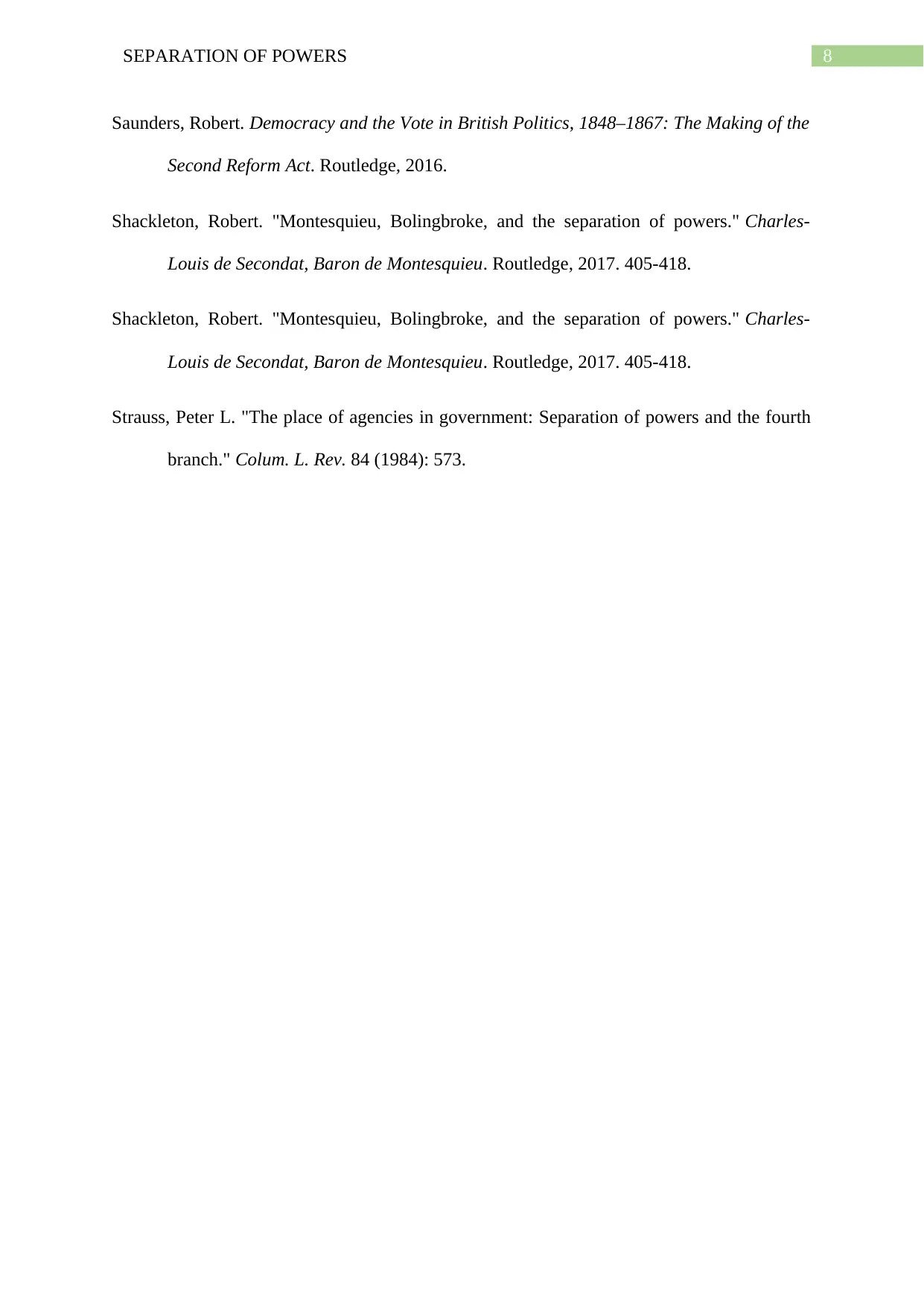
8SEPARATION OF POWERS
Saunders, Robert. Democracy and the Vote in British Politics, 1848–1867: The Making of the
Second Reform Act. Routledge, 2016.
Shackleton, Robert. "Montesquieu, Bolingbroke, and the separation of powers." Charles-
Louis de Secondat, Baron de Montesquieu. Routledge, 2017. 405-418.
Shackleton, Robert. "Montesquieu, Bolingbroke, and the separation of powers." Charles-
Louis de Secondat, Baron de Montesquieu. Routledge, 2017. 405-418.
Strauss, Peter L. "The place of agencies in government: Separation of powers and the fourth
branch." Colum. L. Rev. 84 (1984): 573.
Saunders, Robert. Democracy and the Vote in British Politics, 1848–1867: The Making of the
Second Reform Act. Routledge, 2016.
Shackleton, Robert. "Montesquieu, Bolingbroke, and the separation of powers." Charles-
Louis de Secondat, Baron de Montesquieu. Routledge, 2017. 405-418.
Shackleton, Robert. "Montesquieu, Bolingbroke, and the separation of powers." Charles-
Louis de Secondat, Baron de Montesquieu. Routledge, 2017. 405-418.
Strauss, Peter L. "The place of agencies in government: Separation of powers and the fourth
branch." Colum. L. Rev. 84 (1984): 573.
⊘ This is a preview!⊘
Do you want full access?
Subscribe today to unlock all pages.

Trusted by 1+ million students worldwide
1 out of 9
Related Documents
Your All-in-One AI-Powered Toolkit for Academic Success.
+13062052269
info@desklib.com
Available 24*7 on WhatsApp / Email
![[object Object]](/_next/static/media/star-bottom.7253800d.svg)
Unlock your academic potential
Copyright © 2020–2026 A2Z Services. All Rights Reserved. Developed and managed by ZUCOL.





